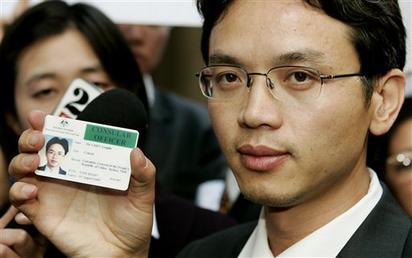One of the most reactionary syndicated columnists in America, Cal Thomas, today takes a broad, bloody swipe at China, leaving his readers (who aren’t the brightest bulbs on the tree to begin with) with the distinct impression that China poses a near-imminent threat to America and we need to take action before it’s too late.
This alarmist nonsense is wrapped around Thomas’ salivating endorsement of a book, China: The Gathering Threat by Constantine Menges — an old-school Communist hater, in love with covert operations, the contras, the death squads, etc. (To be fair, Menges was a noble human being who helped people flee the USSR; he was obsessed, however, with the threat of “Red China” until his death last year.) Thomas oozes fear and loathing of China as he venerates Menges.
Menges writes that China has defined America as its ‘‘main enemy’’ and can now launch nuclear weapons at the United States that are capable of killing 100 million of us. China’s effective espionage operation in the U.S. has managed to steal the designs of nearly all nuclear warheads and other military secrets, he says.
China has threatened to destroy entire American cities if the U.S. helps Taiwan defend itself against a military assault or invasion, Menges writes. China also buys weapons from Russia that are designed to sink U.S. aircraft carriers. It controls more than $200 billion in U.S. debt and sells more than 40 percent of its exports to America, using the profits to strengthen its economy and advanced weapons systems aimed at the U.S.
Until recently, American policy has been to give China access to U.S. markets in hopes that might reduce tensions and hasten democratic reform. It has done no such thing. Menges argues it is time to try another approach.
First, he says, the U.S. must finish development of a reliable missile defense system that can be easily expanded should China, Russia or any nation attempt to overwhelm us by building additional missiles. Menges says the cost of expanding a missile defense system is far less than building new missiles and such cost will be prohibitive to enemy nations once they realize the U.S. can’t be successfully attacked.
Without a working missile defense system, he writes, the increased number of warheads and missiles now available and under construction will make the Chinese threat substantial; he estimates by 2008, China will have more than 400 warheads capable of reaching U.S. territory.
Look, I can’t stand the CCP and I know China’s dumping lots of money into its military. But so are we. Is the US the only nation entitled to be armed? China needs to be watched and, if necessary, reined in. But to portray them as eager to destroy US cities over Taiwan…It’s the closest I’ve seen to good, old-fashioned red baiting. Get a load of this:
As anyone who has bought anything can attest, the United States is fulfilling one of Lenin’s doctrines by purchasing the rope with which the communists plan to hang us. Too many things sold in America are made in China, and too many corporations have moved their plants and operations to China, undermining the U.S. domestic economy and helping a nation that seeks to destroy us.
One of many countermeasures recommended by Menges is the expulsion of all companies that function as fronts for the Chinese People’s Liberation Army or other military or intelligence-related entities in China, Russia or any other nonallied state. Investigative reporter Kenneth R. Timmerman estimates there are hundreds of such front companies in Southern California alone.
Rumsfeld’s remarks and Menges’ book reveal China’s commitment to expanding its empire by intimidation and force, and how the U.S. had better take China’s seriousness seriously if we are to confront and repel it.
So, Southern California is crawling with PLA frontmen determined to destroy us. Who knew? (Never mind that if they destroy us they’d be up shit’s creek, since Walmart won’t be ordering those cheap shoes and tricycles from Guangzhou anymore.)
The decibel level of articles like this is steadily increasing, and poor Mr. Bush, who sold his soul to the far right, will soon find himself in a serious dilemma on the China issue because these loons see China as our blood enemy. There is no compromise. On the other hand, another part of Bush’s soul has been sold to the Corporations, which depend on China to make those cheap toys and textiles (and everything else).
My bet is that Bush is not crazy enough to join the China haters. Just like the immigration issue, he’ll toss in some rhetoric but choose a moderate approach. At least I hope so, ‘cuz if he takes these nutjobs seriously we’re all in trouble.

Comments